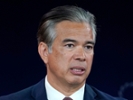|
|
|
|
 
|
Corporate Spotlight
|
Amazon announced the layoffs of about 14,000 corporate employees as the company seeks to focus its investment on AI and other areas it considers its "biggest bets." Layoffs at Amazon ultimately could involve up to 30,000 workers. A blog post outlines the company's goal "to be organized more leanly, with fewer layers and more ownership."
|
|
|
 | Unprepared for AI: The Retail Transformation
AI is transforming retail, but most retailers are unprepared. Join EPAM, Stripe, and commercetools on November 12 at 12 PM EST to learn how AI is redefining the shopper journey and why composability is key to responsible adoption. Register now to build an AI-ready commerce foundation. |
|---|
| |
|
|
 
|
National News
|
Twenty-five states and the District of Columbia sued to preserve Supplemental Nutrition Assistance Program, or SNAP, benefits after the USDA said it is unable to use contingency funds for the program during the government shutdown. The lawsuit was filed amid concerns that millions of families could lose access to SNAP benefits within only a few days. D.C. Attorney General Brian Schwalb wrote in a social media post that 141,000 residents of the District depend on such benefits, adding, "We will do everything we can to prevent DC families from going hungry."
|
|
|
Assistant US Attorney Rebecca Taibleson of the Eastern District of Wisconsin was confirmed to the US Court of Appeals for the 7th Circuit in a 52-46 Senate vote. Taibleson's nomination originally drew criticism from some conservative groups because of certain political donations that she and her husband have made, but the White House and Republican senators largely maintained their support for her.
|
|
| |
 |
| Bonta (Riccardo Savi/Getty Images) |
California Attorney General Rob Bonta said the state will dispatch monitors of its own on Election Day as the Justice Department plans to send observers to polling sites in five counties. "There will be observers of the election monitors, so-called election monitors, that the DOJ is sending," who are "not going to be allowed to interfere in ways that the law prohibits," Bonta said.
|
|
|
|
Financial and Tax Update
|
The Consumer Financial Protection Bureau issued an interpretive rule stating that the Fair Credit Reporting Act preempts state laws that prohibit the listing of medical debt on consumer credit reports. The new guidance calls for courts to strike down such state-level bans "consistent with Congress's intent to create national standards for the credit reporting system."
|
|
|
 
|
PLI Resources
Whether you're a student, faculty member, advisor or librarian, PLI offers essential resources tailored to your needs. Get started with PLI's Law School Hub and receive complimentary access to live and on-demand programs; professional development, skills and lawyer well-being content; pro bono resources and memberships for law clinics; and more. |
|
International commercial arbitration has long been touted as the most efficient method of dispute resolution for cross-border business disputes. Yet the history of complaints about the lack of efficiency and speed in the international arbitration process is just as long -- often taking the form of laments about the "Americanization" of the process. The free article download of the week from PLI Press argues that several aspects of the American system could serve as useful models in helping international arbitration reach its full potential. |
|
|
|
Supreme Court and Federal Court Watch
|
US Solicitor General D. John Sauer requested that the US Supreme Court pause an order by the US Court of Appeals for the District of Columbia Circuit requiring the temporary reinstatement of Shira Perlmutter as the register of copyrights and director of the US Copyright Office. Sauer described the lower court's order as "another case of improper judicial interference with the President's power to remove executive officers."
|
|
|
Elite colleges across the US have reported a decline in Black student enrollment since the US Supreme Court prohibited affirmative action in admissions. New data from 20 selective institutions show Black first-year students now make up as little as 2% of incoming classes at some schools, with Princeton University's share dropping from 9% to just 5% in a single year.
|
|
|
|
ICYMI: The most popular stories from our last issue
|
|
Professional and Business Development
| | | | |
